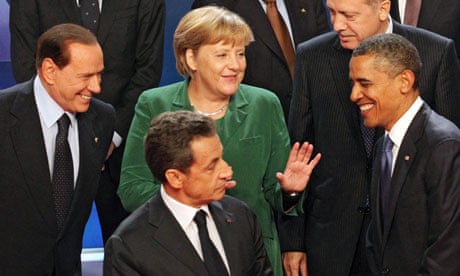Barack Obama is leading a group of world leaders who are effectively ordering Silvio Berlusconi to accept surveillance of Italy's austerity measures by the International Monetary Fund.
The move comes as doubts grow that the Italian prime minister has the capacity to oversee a major debt reduction programme or even to stay in power next week.
Berlusconi had been expected to come to the G20 summit in Cannes with a specific austerity package in line with a lengthy letter he sent to EU leaders at an emergency summit on 27 October.
But divisions within his cabinet meant he arrived empty-handed, frustrating other EU leaders concerned that the euro edifice could collapse.
When asked, the chancellor, George Osborne, did not deny that Britain was making contingency plans for the break-up of the eurozone.
EU leaders fear monetary meltdown is set to spread from Greece to Italy – a far larger economy, and one to which the whole European banking system is severely exposed.
Italian debt yields – the rate at which the bond market is willing to buy Italian debt – rose to alarmingly high levels on Thursday before falling back slightly on the news that Greece had withdrawn a planned referendum on its austerity package. It is far from certain that the Greek government will survive a vote of confidence on Friday.
There are signs that some members of Berlusconi's People of Freedom party in the lower house will defect, making it likely that the PM will be unable to survive a confidence vote next week.
Berlusconi is examining proposals such as raising the pension age, dismissal for redundant public sector workers who do not accept a move to a new job within two years, and the speeding up of assets sales to €5bn (£4.3bn) a year for three years.
He assured world leaders that Italy would be able to pay its debt and had always done so historically. The country faces new tests in further auctions of its debt this month – it has to raise €30.5bn in November and €22.5bn in December.
The European Central Bank has been buying Italian bonds since the start of August. The move initially pushed yields below 5%, but they are now above 6.5% – levels that make it difficult to pay back debt.
Italy's president, Giorgio Napolitano, who would have the responsibility for constructing an interim government if Berlusconi's collapses, has held discussions with party leaders to evaluate the situation.
The concern about Italy is one of the factors driving the G20 summit leaders towards the expansion of an IMF fund on which troubled countries can draw. It is likely the $950bn (£592bn) fund will receive an injection of $300bn, but negotiations about the different contributions by economies including China and Russia are continuing.
Throughout the morning, pressure was applied to European leaders, notably Italy, to sign up to a more specific austerity package or else the US and other countries would not put extra funds into the IMF.
The Italians were resisting the idea of surveillance, which would allow the IMF to ensure Italian commitments to an austerity package are implemented to a clear timetable without any slippage.
Osborne continued to insist that Britain was willing to contribute to the fund along with other countries, but said this should not be seen as a direct bailout of the eurozone. One option under discussion is to use some of that money to beef up the European financial stability facility, the eurozone's bailout fund.
The IMF would essentially print and distribute a certain amount of special drawing rights, an international reserve asset created by the IMF in 1969 to supplement its member countries' official reserves. They are valued based on a basket of major currencies: US dollars, yen, sterling and euros.
